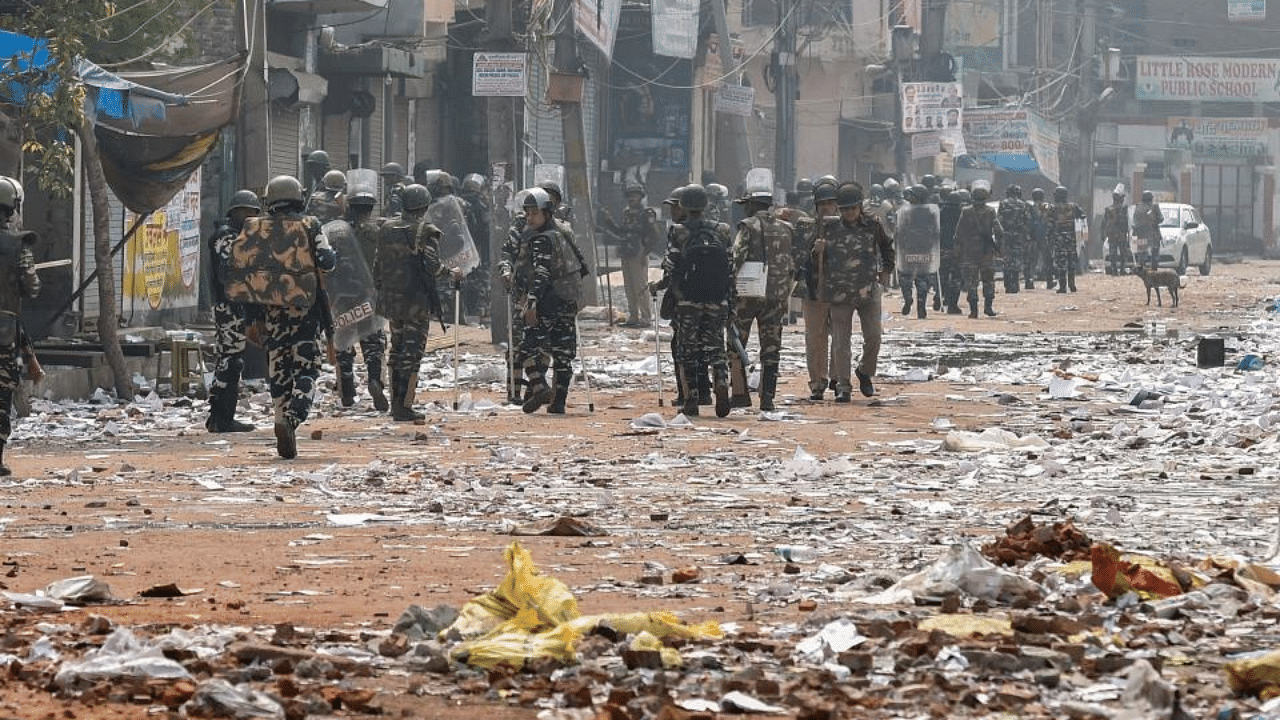
1,753 arrests in 755 FIRs, 1,553 named in 342 charge sheets, 53 killed and 581 injured including 108 police personnel — this is north-east Delhi riots in nutshell as the first anniversary of the communal riots approaches on Tuesday.
Police say investigations are on to solve the remaining almost 350 unsolved riots cases even as it faces criticism of targeting Muslims and anti-Citizenship Amendment Act (anti-CAA) protesters in the name of Delhi riots, a charge vehemently denied by the force.
The Delhi Police 2020 report, released on February 19, and response to DH’s RTI received on February 4 provide some insights into the events of the past one year with regard to investigations of the riot cases though both differ on some points.
One of the points on which the Delhi Police 2020 and the RTI differ is on the starting day of the riots with the former putting it on February 23, 2020. The RTI claims that the north-east Delhi district police put the start of the communal clashes “as per the report of all SHOs (Station House Officers/NED (North-East Delhi)” a day later on February 24, 2020.
The first clash erupted on the afternoon of February 23 soon after BJP leader Kapil Mishra, in presence of his supporters, warned police to remove anti-CAA protesters blocking traffic near Jaffrabad metro station. Mishra’s name does not find a place in the report, though the incident is mentioned.
The hotspots of riots were Khajuri Khas, Bhajanpura, Karawal Nagar, Gokalpuri, Jaffrabad and Dayalpur. Khajuri Khas registered the highest number of cases at 153 followed by Bhajanpura (137) and Gokalpuri (118), according to Delhi Police 2020.
A total of 755 cases, including one by the Special Cell into the larger conspiracy, were registered. The RTI said 754 cases were registered by local police as on January 27 this year. Of this, the Delhi Police 2020 report said 62 cases, including all the 53 murder cases, were transferred to the Crime Branch and the rest 692 were handled by local police.
Amid the accusation that Delhi Police are targeting the minority community, the report said that a “fair number” of accused were from both Hindu and Muslim communities — 820 Hindus and 933 Muslims. Of the 1,753 people arrested, 1,204 are still in custody, “which speaks volume about the quality of investigation”.
The Delhi Police providing religion-wise data assumes importance as it had faced criticism after Special Commissioner (Crime and Economic Offences Wing) Praveer Ranjan had asked investigators on July 8 to exercise “due care and precaution” to avoid “Hindu resentment” while making arrests in riots cases, citing "intelligence input" about the arrest of “some Hindu youth from Chand Bagh and Khajuri Khas areas”.
The police, however, did not provide religion-wise data of people who have received bail or against whom charge sheets have been filed.
According to the police report, 544 people are out on bail while the RTI pegged the number at 557 as on January 27. The report also said 342 charge sheets against 1,553 people have been filed by December 2020 (RTI says 300 by north-east Delhi police). Out of these, the trial courts have taken cognizance of 250 cases and in some important cases, 'arguments on charge' has begun.
However, north-east Delhi police refused to provide the names of arrested persons through RTI saying revealing "sensitive" information would have an adverse impact on investigations. It has also denied information on the number of people charge-sheeted as well as courts taking cognizance of charges though the Delhi Police 2020 provides those details.
From the report as well as RTI, it comes to light that charges have not been framed against any of the accused so far.
Police said it used video analytics and facial recognition system to analyse 945 CCTV footage and video recordings obtained from multiple sources, dump data analysis, geo location, facial reconstruction and e-Vahan access database to identify the accused.
According to the police report, the Muslim community "nurtured a feeling of discrimination" on the grounds of National Register of Citizens (NRC) and CAA and certain groups with "vested interests capitalised on this feeling and further aroused the sentiments of this community against the central government".
It also goes on to say that the protesters saw an "opportunity to embarrass the Union government" during the visit of the then United States President Donald Trump by organising road blockades and attacks on the police to create disturbances in communally sensitive pockets of Delhi in the name of protest against CAA and NRC.
Seeking to link the anti-CAA protests with the riots, the report says that 23 illegal sit-in protest spots sprang up in the capital, including nine in north-east Delhi. During Trump's visit, the "conspirators" blocked and choked major arterial roads of north-east Delhi to grab the attention of international media.
It argues that the organisers of riots were aware of the fact that any communal violence in Delhi during Trump's visit would immediately be picked up by the international media and would cause huge embarrassment to the Indian government.
The Ministry of Home Affairs has also defended Delhi Police in Parliament during the first leg of the Budget session, even as there were complaints that the police did not help minority community members during the riots and were biased in their actions.
In a written reply in the Lok Sabha, Minister of State for Home G Kishan Reddy said the police acted swiftly in an impartial and fair manner.
"Proportionate and appropriate actions were taken by Delhi Police to control the situation. Sincere, dedicated and incessant efforts made by Delhi Police brought the riotous situation to normalcy within a short span of time and also prevented the riots from spreading across to other areas of Delhi/NCR," Reddy said.
